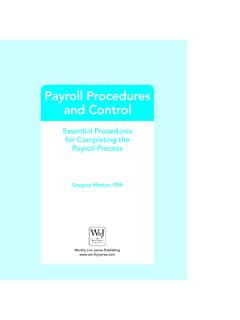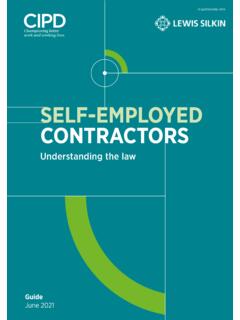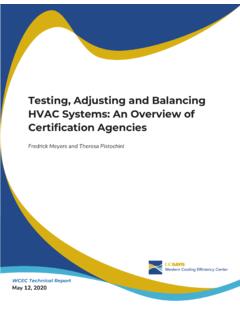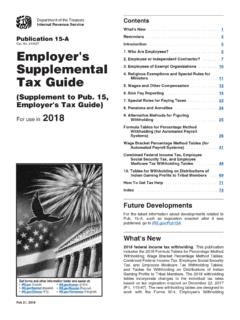Transcription of Who can be in private practice? Should I be a 1099 ... - IMHCA
1 Who can be in private practice? Should I be a 1099 independent contractor or an employee ? 225 ILCS 107/10) Sec. 10. Definitions. +AND+OCCUPATIONS&ActName=Professional+Co unselor+and+Clinical+Professional+Counse lor+Licensing+Act. "Professional counseling" means the provision of services to individuals, couples, groups, families, and organizations in any one or more of the fields of professional counseling. "Professional counseling" includes the therapeutic process of: (i) conducting assessments and diagnosing for the purpose of establishing treatment goals and objectives and (ii) planning, implementing, and evaluating treatment plans using treatment interventions to facilitate human development and to identify and remediate mental, emotional, or behavioral disorders and associated distresses that interfere with mental health.
2 Professional counseling may also include clinical professional counseling as long as it is not conducted in independent private practice as defined in this Act. "Clinical professional counseling" means the provision of professional counseling and mental health services, which includes, but is not limited to, the application of clinical counseling theory and techniques to prevent and alleviate mental and emotional disorders and psychopathology and to promote optimal mental health, rehabilitation, treatment, testing, assessment, and evaluation. "Clinical professional counseling" may include the practice of professional counseling as defined in this Act. It also includes clinical counseling and psychotherapy in a professional relationship to assist individuals, couples, families, groups, and organizations to alleviate emotional disorders, to understand conscious and unconscious motivation, to resolve emotional, relationship, and attitudinal conflicts, and to modify behaviors that interfere with effective emotional, social, adaptive, and intellectual functioning.
3 "Licensed professional counselor" and "professional counselor" means a person who holds a license authorizing the practice of professional counseling as defined in this Act. "Licensed clinical professional counselor" and "clinical professional counselor" means a person who holds a license authorizing the independent practice of clinical professional counseling in private practice as defined in this Act. " independent private practice of clinical professional counseling" means the application of clinical professional counseling knowledge and skills by a licensed clinical professional counselor who regulates and is responsible for her or his own practice or treatment procedures. (225 ILCS 107/18) Sec. 18. Provision of clinical services by licensed professional counselors; scope of practice. (a) Licensed professional counselors may not engage in the independent practice of clinical professional counseling without a clinical professional counselor license.
4 (b) In an independent private practice, a licensed professional counselor must practice at all times under the order, control, and full professional responsibility of a licensed clinical professional counselor, a licensed clinical social worker, a licensed clinical psychologist, or a psychiatrist as defined in Section 1-121 of the Mental Health and Developmental Disabilities Code. (c) When providing clinical professional counseling as set forth in this Act, a licensed professional counselor may not represent himself or herself as a sole or independent practitioner and may not use the title "clinical professional counselor" or "licensed clinical professional counselor". A licensed professional counselor providing clinical professional counseling shall always operate and represent himself or herself as providing services through or as a part of a group practice or through a clinical supervisor's practice, and the licensed professional counselor shall have no ownership interest in either type of practice.
5 Licensed professional counselors providing clinical services shall provide the name and contact information of the licensed professional counselor's supervisor to all clients. What does all this mean? In my opinion it is saying LPC (professional counselors) can provide professional counseling but not in an independent private practice. LCPCs can be in an independent private practice. (225 ILCS 107/18) Sec. 18. LPCs can not be in independent practice. The LPC must practice at all times under the order, control, and full professional responsibility. IRS Regulations What does it mean to be independent ? The IRS defines this. Common Law Rules Facts that provide evidence of the degree of control and independence fall into three categories: 1. Behavioral: Does the company control or have the right to control what the worker does and how the worker does his or her job?
6 2. Financial: Are the business aspects of the worker s job controlled by the payer? (these include things like how worker is paid, whether expenses are reimbursed, who provides tools/supplies, etc.) 3. Type of Relationship: Are there written contracts or employee type benefits ( pension plan, insurance, vacation pay, etc.)? Will the relationship continue and is the work performed a key aspect of the business? You are not an independent contractor if you perform services that can be controlled by an employer (what will be done and how it will be done). Many people explain to me that they are getting clinical supervision. This has no bearing on the type or work relationship that exists. It is an irrelevant piece of information to the issue of employee or independent contractor . Training If the business provides the worker with training on how to do the job, this indicates that the business wants the job done in a particular way.
7 This is strong evidence that the worker is an employee . Periodic or on-going training about procedures and methods is even stronger evidence of an employer- employee relationship. Evaluation System If an evaluation system measures the details of how the work is performed, then these factors would point to an employee . Types of Instructions Given An employee is generally subject to the business s instructions about when, where, and how to work. All of the following are examples of types of instructions about how to do work. When and where to do the work. What work must be performed by a specified individual. What order or sequence to follow when performing the work. A worker is an employee when the business has the right to direct and control the worker. The LPC must practice at all times under the order, control, and full professional responsibility.
8 I don t see any situation where a LPC who is required to be under the order, control of a LCPC could not be considered to be classified as an employee . IRS 20 point checklist. A 1099 is an independent contractor . Sec. 18. LPCs can not be in independent practice. If you are an independent contractor then you are in independent practice. You can t have it both ways. Either you are independent and do what you want or you are an employee and under someone s order and control. My conclusion from all of this is that LPCs can not be 1099 independent contractors and must be employees in order to practice. If you are in violation of this then your malpractice insurance may not cover you as you are providing services outside your scope of practice. A footnote: The Social Worker Act says: Section independent Practice of Clinical Social Work c) When providing clinical social work services as set forth in Section 3(5) of the Act (in the independent practice of clinical social work), a Licensed Social Worker shall always operate and represent himself/herself as an employee of the independent practice and may not work as an independent contractor as defined by Internal Revenue Service regulations.
9






